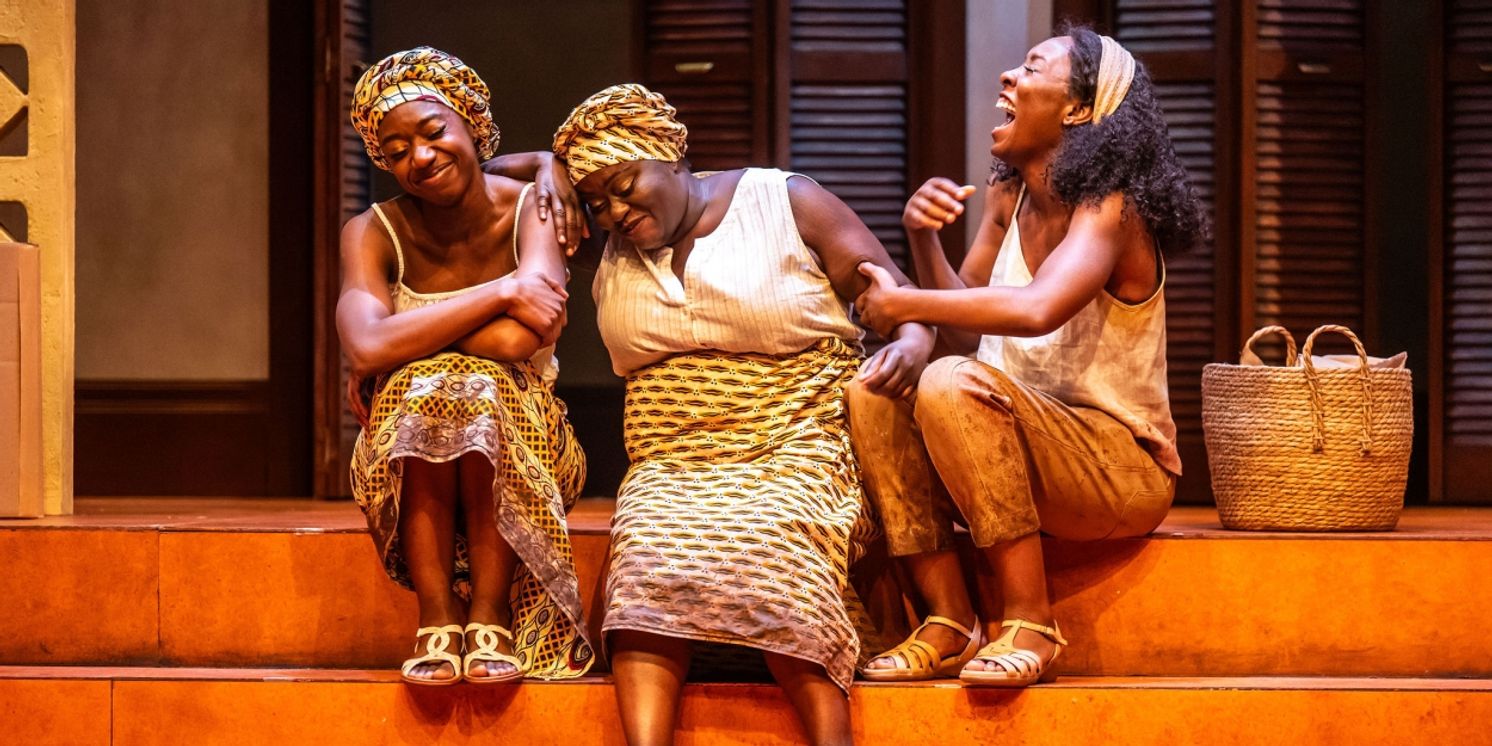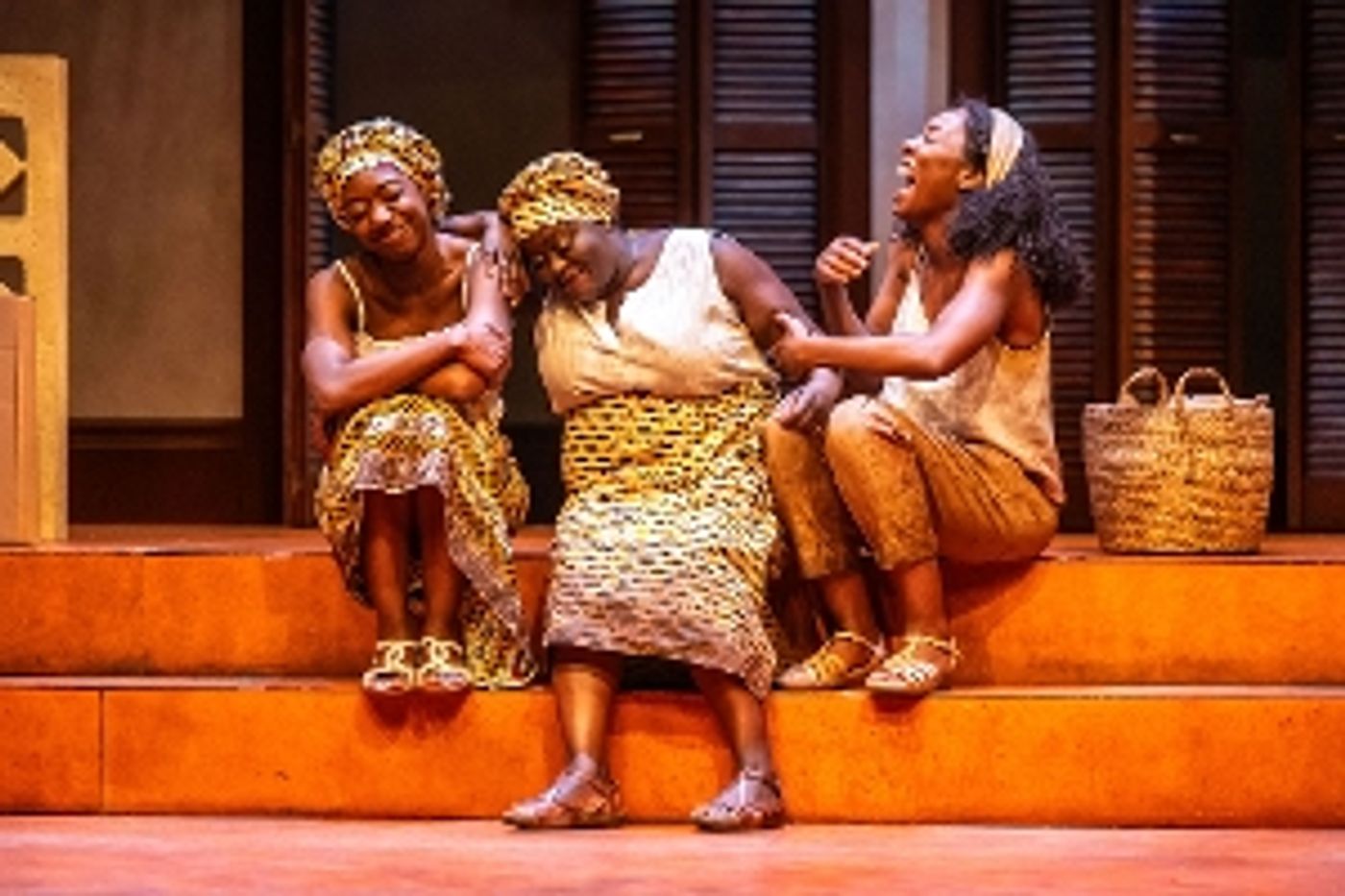Interview: Makambe K. Simamba of THREE SISTERS at Soulpepper
Check out the interview!

 This month, Soulpepper brings Inua Ellams' THREE SISTERS to Toronto. First performed at The National Theatre of London in 2019, the epic retelling of Anton Chekhov's play of the same name was a sensation, sparking discussions about the history of colonialism in Africa and how that history reverberates with centuries-long consequences. Nigerian playwright Ellams sets the play in Igboland in his home country, where the three sisters, daughters of a military official who died a year before the play begins, chafe against the boundaries of their small town and dream of a better life in their former home, big-city Lagos, until the realities of war come home to roost.
This month, Soulpepper brings Inua Ellams' THREE SISTERS to Toronto. First performed at The National Theatre of London in 2019, the epic retelling of Anton Chekhov's play of the same name was a sensation, sparking discussions about the history of colonialism in Africa and how that history reverberates with centuries-long consequences. Nigerian playwright Ellams sets the play in Igboland in his home country, where the three sisters, daughters of a military official who died a year before the play begins, chafe against the boundaries of their small town and dream of a better life in their former home, big-city Lagos, until the realities of war come home to roost.
BroadwayWorld spoke to Makambe K. Simamba, who plays Udo, the youngest of the three sisters, about the play's historical context and how playwright Ellams finds new meaning in Chekhov's classic.
BWW: What excites you the most about doing this play?
MAKAMBE: So many things: but my favourite is getting to play a young African woman who is vivacious, curious, full of questions and full of hope. I also feel excited to tell a story that is Nigerian, and specific to the Igbo tribe. Getting to dig into the historic and cultural specificity is a privilege.
BWW: What should audience members know about the Nigerian Civil War of 1967-1970 and the Biafran Seccessionist Movement before seeing THREE SISTERS?
MAKAMBE: There is so much to know, and the beautiful gift of Inua Ellams’ writing is that he explains the war and what lead up to it through the script, so a person coming in with little context will be able to leave with a strong idea about the facts and series of events that lead to the war, and its eventual conclusion.
Nmeri Ora (Tuzenbach in the original) has a line that I can’t stop thinking about. About Britain’s role in the Biafran war, he asks “You don’t think the British are responsible? They created Nigeria, forced 250 ethnic groups and languages together, created this pressure cooker, now watch as it explodes.”
I do think that Ellams explains the situation clearly, but if there was something I wanted folks to really understand about Africa as a whole and Nigeria specifically, is that the idea of “Nigeria” or even of my country of birth, “Zambia,” refers largely to land that was carved up by Europeans. In both cases, the British carved borders and boundaries in a way that suited and made sense to them, but the reality is that those boundaries hold (and sometimes divide) ancient cultures and societies and kingdoms that continue to exist in ways that are often in conflict with those very boundaries.
BWW: You play Udo, the youngest sister, who is inspired by Irina in Chekhov's play. In the original, Irina is on the cusp of adulthood, suspended between childhood games and the desire to find her future through true love. What aspects of her character carry through in Ellams' reimagining, and what's new in this version?
MAKAMBE: Here's my interpretation of Udo: Yes, she is very much on the cusp of adulthood. She has grown up with a great amount of privilege, and navigates both the warmth of being the baby of the family, with the deep need to be taken seriously. She is searching for her purpose at a time when her Igbo people are searching for (and fighting for) sovereignty.
To me, she represents hope – not just the pursuit of it, but the need for it in times of great conflict, uncertainty, and despair.
And yes, she wants romantic love (Don’t we all?). But through her arc we see her investigate and wrestle with what that can and should look like at a time when her people are being killed by the thousands, and the future of her country is dangerously uncertain.
BWW: When it premiered at London's National Theatre in 2019, the play was hailed as a searing criticism of British neocolonialism. How do you think these themes will play in Canada, and what do you think audiences will take away from the show?
MAKAMBE: I hope that when folks see the show, they think not just about Britain’s role as a continued dominating colonial power across the globe, and what that has meant for countries like Nigeria. I also hope they continue to interrogate and understand Canada’s role as a colonial power (we still have Queen Elizabeth on our $20 bill, we still have Indigenous communities living without access to drinkable, running water, our Prime Minister has continued to publicly support Israel despite the horrific images we are seeing of what is being inflicted on Palestinian people).
I could go on, but I hope they take away the fact that:
1. Igbo people of Nigeria and Nigeria as a whole lived through this brutal and devastating conflict in which hundreds of thousands (some sources even estimated up to 1 million) Igbo people lost their lives. And it’s not talked about enough.
2. I also hope they understand and see Gaza, Sudan, Congo, and all other places in the world, past and present where colonial forces have contributed to ethnic tensions, the pillaging of resources, and devastating war.
BWW: Culture and art are vital to the three sisters. How does Ellams incorporate Nigerian culture and art into the play?
MAKAMBE: On top of writing the dialogue with the melodic sensibility of how many Nigerians speak English, Ellams skillfully offers through his script, the gifts of Igbo (and Yoruba and Hausa) words, mellifluous Pidgeon English spoken by the servants, and even the mention of culturally specific foods like “akpu and bitter leaf soup” and activities like “Igba mgba” (traditional wrestling) to really give a sense of the richness and texture of the community where the story takes place.
Lolo, the eldest sister, shares with Udo that one of their father’s intentions in moving them from Lagos to Owerri, (on top of to escape the political unrest he knew was coming) was for them to root themselves in their Igbo traditions. The sisters enjoy the pride and deep connection of their indigenous culture and roots, while at the same time, hold an awareness and appreciation for popular art from the west. One moment, the stage is filled with “Atula Egu Gi Kam Nonyere” an emotional Igbo workship song. Later, Udo belts “Downtown” by Petula Clark with confidence and glee.
This coexistence of Igbo indigeneity and Western influence is a perfect metaphor for colonisation and the forces that eventually create the war we see depicted throughout the play. The coexistence for these two worlds appears at times seamless, and is at times violent – and that is something the characters continue to navigate on multiple levels over the course of the story.
BWW: Chekhov's piece is set in pre-revolutionary Russia, the sisters essentially in exile from Moscow in a small town where little happens. Ellams' play brings the revolution a little closer than that. What kind of new dimensions does this proximity to violence and potential change add to the story?
MAKAMBE: The play takes place in a small town called Owerri, in traditional Igboland. In Ellams’ adaptation, the sisters first home is actually the Nigeria capital, Lagos – the place where Udo longs to be the most.
At the top of the play, we learn that the girls’ father was a military man – a brigade commander in fact, who sensed the tension that would arise between the different ethnic groups after Nigeria’s independence, and made the decision to move his family to Owerri for safety.
When a bombing finally happens in the sister’s town, it shakes everyone to their core. It’s one thing to talk about the war – to intellectually understand that it is coming closer. It is a whole different thing to experience an actual bombing, its chaos, and its humbling aftermath. What does such an attack do not just to the infrastructure of a village, city, or town - but to the psyche of that place's residents?
BWW: How are Soulpepper and Obsidian Theatre bringing the play to life?
MAKAMBE: With great passion, intention and humility.
Photo of Akosua Amo-Adem, Virgilia Griffith, and Makambe K. Simamba by Dahlia Katz
Videos

